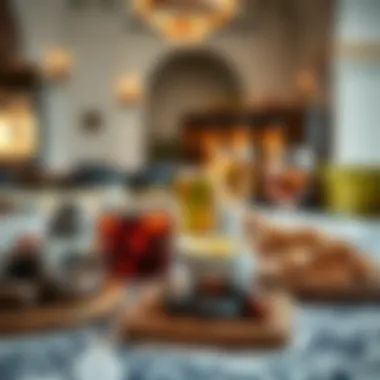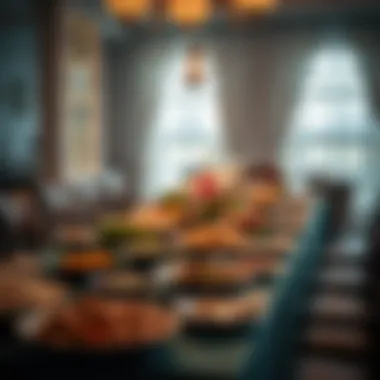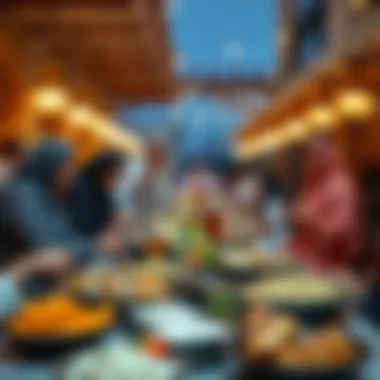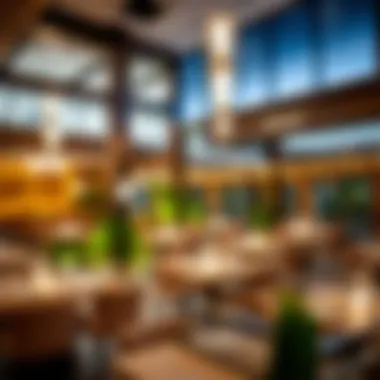Discovering Iftar Time in Dubai: Culture and Cuisine


Intro
Iftar, the meal consumed by Muslims to break their fast during the holy month of Ramadan, is a time rich in cultural tradition and culinary delight, especially in a bustling metropolis like Dubai. The city, a melting pot of cultures, brings together various customs and flavors in a unique celebration of food and community. Each evening during Ramadan, as the sun dips below the horizon, families, friends, and even strangers gather to share in the experience of Iftar, transforming a simple meal into a moment of connection.
In this article, we will explore the significance of Iftar time in Dubai, diving into its deep-rooted traditions, the array of local delicacies that burst forth on dinner tables, and the vibrant social gatherings that define this period. It’s not just about food; it’s about community, sharing, and the spirit of Ramadan that unites people from different walks of life.
Market Trends
Current Market Analysis
Dubai’s dining scene has undergone a remarkable transformation in recent years, particularly during Ramadan. Restaurants and eateries enhance their offerings to capture the essence of Iftar, making it not only a culinary experience but a significant commercial opportunity.
- Diverse Choices: From traditional Emirati dishes like harees and shorbat adas to international cuisines, diners can find an extensive range of options. Many restaurants introduce special Iftar menus to attract both locals and tourists, creating a buffet of flavors to cater to varying tastes.
- Social Connection: Iftar serves as a social gathering time, fostering community bonds. As people from various backgrounds come together to break fast, establishments see a surge in group bookings and family gatherings.
"Iftar offers a chance for people to not only enjoy food but also to connect, which is vital in our fast-paced city."
- E-commerce Growth: The rise in delivery apps has made it easier for people to enjoy Iftar at home. Many restaurants now provide delivery services tailored specifically for this time, showcasing their unique dishes through promotional offers.
Future Projections
As we look to the future, the trends in Dubai’s Iftar dining are set to evolve further:
- Sustainability Focus: Expect a shift toward sustainable dining practices, with restaurants sourcing local ingredients to reduce their carbon footprint. This aligns with a global push for environmental consciousness.
- Technological Integration: Restaurants will likely adopt more tech-driven solutions, like online ordering, virtual menus, and augmented reality experiences to enhance customer engagement during Iftar.
- Cultural Appreciation: As Dubai continues to position itself as a global hub, showcasing culinary excellence from every corner of the world during Ramadan will become pivotal. This cultural embrace will not only enhance the Iftar experience but also boost tourism.
Understanding Iftar
Iftar marks a significant moment during Ramadan, the holy month in which Muslims fast from dawn to sunset. In Dubai, this daily ritual isn't merely about breaking a fast; it's a lively celebration steeped in tradition, culture, and community. The time of Iftar is more than just a meal; it conveys deep-rooted values of hospitality and togetherness. For those not accustomed to this practice, grasping its intricate significance can enhance their experience during Ramadan.
Definition and Tradition
At its core, Iftar is the evening meal served after sunset that breaks the fast. Traditionally, the meal begins with the consumption of dates and water, emulating the practice of the Prophet Muhammad. It’s a simple yet profound act. The ritual serves both a practical and spiritual purpose – symbolizing nourishment after a day of abstention.
In Dubai, the tradition of Iftar extends beyond families sharing food; it transforms into communal gatherings. Streets fill with the aroma of various delicacies, from steaming pots of lamb stew to fragrant rice dishes. Community centers, mosques, and public places often set up large tables to accommodate those who may not have a family to dine with, fostering inclusivity and connection among residents and visitors alike.
Historical Context
Historically, Iftar in Dubai can be traced back centuries. Its roots weave through the fabric of Islamic tradition and the social life of the region. In earlier times, the simple act of sharing food with neighbors and guests signified generosity and unity.
As Dubai evolved through trade and cultural exchanges, so did its Iftar practices. Over time, local flavors blended with spices brought in by traders, leading to a rich culinary tapestry. This vibrant history makes Iftar not just a meal but a journey through time, reflecting the city’s growth and the enduring spirit of community.
“Iftar is where the heart of community beats.”
This phrase captures the essence of how Iftar resonates within the city. It’s a practice that binds the people of Dubai, creating a sense of belonging and shared identity.
Understanding Iftar is crucial for anyone looking to appreciate the cultural, culinary, and social dimensions of Ramadan in Dubai. Whether one is a local, a tourist, or someone deeply interested in cultural studies, recognizing the significance of this tradition can illuminate insights into the communal and spiritual fabric of the city.
The Importance of Iftar in Dubai
Iftar represents more than just a meal breaking the fast; it's a moment that encapsulates deep cultural roots and communal bonds within Dubai's diverse fabric. In this vibrant city, the significance of Iftar extends far beyond its customary role during Ramadan, impacting social dynamics, business operations, and fostering inclusive practices among residents and visitors alike.
Cultural Significance


To understand the cultural importance of Iftar in Dubai, one must acknowledge that it acts as a unifying force. During Ramadan, the act of fasting is not solely a personal journey; it embodies a collective experience that reinforces community ties. As the sun dips below the horizon, the city comes alive with sounds of celebration, laughter, and the clinking of plates.
Many families and friends gather around intricately adorned tables, sharing both food and stories. Traditional dishes like dates, samosas, and harira hold deeper meanings. They remind people of their heritage, with recipes passed down through generations. In various neighborhoods, you can see large communal tents set up, where anyone can join in the feast. This exemplifies Dubai’s ethos of hospitality and inclusivity, inviting people from all backgrounds, whether local or tourist, to partake in this experience.
It's essential to note that beyond the food, the rituals linked to Iftar—such as Maghrib prayers and the communal atmosphere—create a sense of belonging. As the call to prayer echoes through the streets, there is a moment of pause, where time seems to stand still, allowing individuals to reflect on the day's blessings.
Social Gatherings
The social element of Iftar in Dubai cannot be overlooked. It’s not just about nourishing the body; it’s about nourishing relationships. People often host Iftar gatherings, inviting friends, families, and colleagues, strengthening bonds that might otherwise wane in our busy lives. In a cosmopolitan city like Dubai, where diversity thrives, these gatherings transcend cultural barriers. They are an opportunity to learn about different culinary traditions, with each household potentially offering something unique, whether it's Emirati machboos or a spicy biryani.
In essence, Iftar serves as a platform for networking and social interactions. Businesses often leverage this time to show appreciation to employees or cultivate relationships with clients, which is why many corporate offices invest in elaborate Iftar spreads. From sumptuous buffets catered by top hotels to intimate home-cooked meals, the variety reflects Dubai’s culinary landscape.
Additionally, many hotels and restaurants host special Iftar events, contributing significantly to Dubai's economy during this month. It is vital for investors and business owners in the hospitality sector to grasp this seasonal surge, as they can tap into customer preferences that emerge specifically during Ramadan.
"In Dubai, Iftar is more than a meal; it’s a celebration of unity, a cultural exchange, and an economic opportunity that binds us all together during Ramadan."
Thus, Iftar in Dubai touches on personal, social, and economic levels, illustrating the intricate tapestry woven by tradition and innovation. The communal meals serve as a reminder that while individuals may fast alone, their experience is inherently intertwined with others, empowering everyone to celebrate humanity's shared joys and trials.
Culinary Offerings for Iftar
Culinary offerings for Iftar represent a rich tapestry of flavors, traditions, and local ingredients, pivotal to the celebration of Ramadan in Dubai. This section illuminates how food is not just sustenance but also a vibrant means of connecting family and friends during this significant month. Each dish serves not only to break the fast but to weave stories of heritage and community.
Traditional Foods
The heartbeat of Iftar in Dubai is undoubtedly the traditional foods that grace tables across the emirate. Dates, often flavored with various nuts or filled with cream, hold a special place, symbolizing sustenance and tradition. As the sun sets, it's common to see families gathering around plates piled high with sambusas, those delightful pastry triangles filled with spiced meat or vegetables.
You might also encounter harira, a hearty soup enriched with a blend of spices, lentils, and tomatoes. Its warmth is comforting after a long day of fasting. Another staple is biryani, a fragrant rice dish oftentimes layered with marinated chicken or lamb and seasoned with saffron, which cannot be overlooked. The thoughtfulness embedded in preparing these meals hints at a sense of nostalgia and belonging, reminiscent of shared stories around a communal table.
Modern Variations
While traditional foods remain at the forefront, modern interpretations of Iftar cuisine are rapidly gaining popularity in Dubai. Trendy restaurants often infuse international flavors into beloved classics, creating dishes like sushi rolls with dates or quesadillas filled with Arabic khubez bread and grilled chicken. This creativity not only reflects the dynamic nature of Dubai's culinary scene but also caters to a diverse population with varying tastes.
For those seeking a unique twist, some eateries offer gourmet burgers topped with traditional spices, bridging the gap between contemporary dining and rich cultural heritage. These modern variations broaden the culinary experience of Iftar, attracting both locals and tourists eager to indulge in something fresh while still respecting traditional roots.
Popular Restaurants and Buffets
Dubai's gastronomic landscape boasts numerous venues that offer unforgettable Iftar experiences. Among the most renowned is Al Fanar Restaurant & Café, which provides an immersive journey through Emirati cuisine with dishes revered for their authenticity. The ambiance echoes tradition while the flavors tantalize the taste buds, creating a memorable dining experience.
Another favorite, Café Bateel, presents beautiful Iftar buffets featuring an array of delicacies. Their menu includes everything from the popular fattoush salad to an assortment of dates, highlighting the beauty integral to Emirati culture.
Moreover, Traders Hotel is known for its lavish spreads that blend both local and international cuisines to cater to diverse palates. The interplay of traditional and innovative culinary offerings draws numerous guests, underscoring Dubai’s reputation as a culinary hub.
As Iftar continues to evolve, these restaurants maintain not just a commitment to flavor but also a dedication to inclusivity, making the traditions more accessible to everyone in Dubai.
"In Dubai, Iftar is more than a meal; it’s a celebration of togetherness, culture, and culinary creativity."
By exploring the rich culinary offerings during Iftar, one can appreciate the seamless blend of culture and community that is so intrinsic to Dubai's spirit during Ramadan.
Ramadan and Its Impact on Dubai's Dining Scene
During Ramadan, Dubai's dining scene transforms in ways that go beyond just adjusting eating schedules. This period brings about a unique atmosphere that reflects deep cultural traditions while catering to modern demands. As the sun sets, the city faces a vibrant shift—restaurants and families alike gather to break their fast, marking the end of the day with a communal meal known as Iftar. This segment examines how Ramadan induces significant changes in the dining landscape of Dubai, addressing both logistical adaptations by businesses and the engagement of tourists in this rich cultural tapestry.


Business Adjustments
Businesses in Dubai are keenly aware that Ramadan is no ordinary month; it's a time that demands considerable adjustments. Restaurants, cafes, and hotels experience a rush in the evenings as patrons flock to enjoy Iftar. Many establishments change their operating hours—opening just before sunset and not closing until late into the night. Additionally, they often offer special Iftar menus, highlighting local delicacies and international cuisine to cater to diverse tastes.
- Flexible Menus: Many eateries are preparing set menus that allow customers to sample multiple dishes at a fair price. It’s a practical option for families and groups wanting to experience a variety of flavors while breaking their fast.
- Enhanced Customer Experience: Establishments invest in ambiance, lighting, and decoration that reflect Ramadan's spirit, providing a welcoming atmosphere. This effort draws in both locals and tourists alike who are eager to immerse themselves in the traditions of the time.
Furthermore, catering options skyrocket during Ramadan. Many families opt to have their Iftar meals at home but still seek out specialized catering services to ensure a memorable meal without the prep work. This pivot has seen a surge in business for many local chefs and home-based cooks entering the catering scene.
Tourist Engagement
For tourists visiting Dubai during Ramadan, the experience is often unforgettable. The city’s hotels and culinary scenes embrace the season with open arms, creating unique opportunities for cultural engagement.
- Iftar Experiences: Many hotels offer Iftar buffets that not only present a wide array of culinary options but also provide insights into the cultural significance behind each dish. Tourists can participate in guided Iftar events, where they learn about the customs and traditions while savoring traditional foods.
- Cultural Tours: Some travel agencies organize special tours focusing on the religious and cultural importance of Ramadan. These tours provide a comprehensive understanding of how Iftar times influence daily life in Dubai. Such connections foster a deeper appreciation among visitors for the rich tapestry of local culture.
"Experiencing Iftar in Dubai is like diving into an ocean of flavors and traditions—each bite tells a story."
As the month progresses, tourists are able to witness the communal spirit that epitomizes Ramadan. From shared dining experiences to community gatherings, the allure of Iftar fosters a sense of togetherness among people of all backgrounds. This cultural exchange enriches the overall appeal of Dubai as a destination, making the city not just a place for luxury but a hub for cultural immersion during this special month.
Participation in Iftar
Iftar, the evening meal marking the end of a day of fasting during Ramadan, signifies more than merely breaking a fast. In Dubai, participation in Iftar embodies cultural unity and community bonding. It’s a moment where families, friends, and even strangers gather to share food, stories, and experiences. Thus, understanding the aspects of participation in Iftar is essential to grasp the broader cultural tapestry of Dubai.
Etiquette and Customs
When it comes to Iftar, etiquette holds a critical place in ensuring the evening’s significance is fully realized. An adage often heard is "it’s the thought that counts,” and this rings especially true during Iftar. Guests are typically invited to join in the meal, but knowing the right customs can elevate the experience.
- Breaking the Fast: Traditionally, the fast is broken with dates and water, harkening back to the practices of the Prophet Muhammad. This simple act is rich in meaning; it's like a toast before a feast.
- Timing is Key: Iftar begins at sunset, so everyone usually gathers before the call to prayer, or Adhan. Punctuality is appreciated, as the energy in the room thickens with anticipation.
- Respecting Diversity: Dubai is home to various nationalities, so some customs and traditions may differ. That being said, an openness to learn about others' practices creates an inviting atmosphere.
"During Iftar, we eat together, regardless of our backgrounds. It's a time for openness and connection."
In terms of dining layout, it’s typical to have a communal setup. Sharing plates and serving each other is quite common, symbolizing bond and generosity. Also, wait your turn to serve others before taking food for yourself—small acts of courtesy that resonate deeply in Arab culture.
Inclusive Options for Everyone
While Iftar is instilled with tradition, it also lights the way for inclusivity. Given Dubai’s multicultural environment, several restaurateurs and establishments cater to various dietary restrictions and preferences, ensuring everyone can join the table.
- Vegetarian and Vegan Options: Many places now offer dishes that cater specifically to those who abstain from animal products. Hummus, falafel, and a variety of vegetable-based dishes represent the region well while catering to health-conscious individuals.
- Gluten-Free Choices: Some restaurants have started highlighting gluten-free options, too, allowing individuals sensitive to gluten to partake without worry.
- Non-Muslim Participation: Not only Muslims participate in Iftar, but often, non-Muslims are welcomed to join in, fostering greater understanding. Some restaurants even organize special Iftar buffets throughout Ramadan that are open to everyone.
In short, the sheer diversity in food offerings can make joining an Iftar an enlightening experience. Many establishments embrace innovation by reinterprting traditional recipes, thereby ensuring everyone—regardless of background—can savor a taste of Ramadan.
Taking part in Iftar in Dubai is not simply about food; it's about community engagement and understanding the shared values that unite people in this vibrant city. Whether it’s acknowledging the customs or ensuring inclusivity, each element contributes to a beautiful mosaic uniquely representative of Dubai's spirit.
Timing and Scheduling for Iftar in Dubai
When Ramadan rolls around, the timing of Iftar in Dubai takes center stage. It's not just about breaking a fast; it's a carefully choreographed event that intertwines with the daily rhythm of life in this vibrant city. Understanding how the timing is determined and the subsequent scheduling impacts various aspects of both daily life and community engagement is crucial.
Sunset and Iftar Timing
Iftar occurs at sunset, and this moment is significant. The local authorities publish adhan times daily, which signal the end of the day’s fasting. In Dubai, the timings shift slightly throughout Ramadan due to the lunar calendar. Each day can vary by a few minutes.
The adhan is broadcasted across the city, often from the towering minarets of mosques, enveloping the streets in an audible reminder that it’s time to gather and reflect. Many people in Dubai keep an eye on the sunset through various means—be it their mobile apps, watches, or the simple act of looking westward.


"For many, the moment when the sunset calls is not just a signal to eat, but also a chance to pause and appreciate the day."
In ramadan, traditional foods like dates and water may hold a symbolic significance, being the first items consumed at Iftar. Other specialties, like lentil soup and lamb dishes, usually follow right after. This cultural observance adds layers, creating a sense of anticipation and excitement as families and friends come together.
Impact on Daily Life
The timing of Iftar doesn’t only affect meal times—it influences entire routines. Those observing Ramadan often adjust their schedules, taking into account the fasting hours leading up to Iftar. People tend to wake up before dawn for Suhoor, the pre-dawn meal, and this alters their work and social lives.
In many workplaces, flexible hours are common. Employees might arrive later and stay later to ensure they can participate in Iftar. Cafes and restaurants in Dubai cater to the evening rush, serving up a range of culinary delights as soon as the adhan echoes in the air. This creates a lively atmosphere, signaling the importance of community over mere nourishment.
On the flip side, non-Muslims and those not observing Ramadan are also aware; many places remain open, but with adjustments made to their service hours to accommodate the local customs. This fusion establishes a unique harmony in daily life, where cultural respect intersects seamlessly with economic activity.
In essence, the scheduling around Iftar in Dubai transcends mere timekeeping. It fosters a cultural tapestry woven through respect, tradition, and community involvement.
As Iftar approaches, the city begins to pulse with a blend of excitement and spirituality, creating an environment where every sunset signals not just the end of a fast, but the beginning of cherished connections, culinary adventures, and heartfelt exchanges.
Iftar Beyond Ramadan
Iftar, as an integral part of the Ramadan experience, needn’t be confined to just one month of the year. In Dubai, the significance of Iftar expands beyond Ramadan, intertwining with the cultural fabric of the city throughout the year. This is not just a meal; it signifies a communal rite that encapsulates the essence of sharing, community, and hospitality that the region is known for. Let’s explore the facets of Iftar that resonate well beyond the holy month.
Year-Round Traditions
In many families, the essence of Iftar is rekindled throughout the year during special occasions like weddings, Eid celebrations, and even gatherings just to honour one another's company. It’s a cultural hallmark that brings people together around the dinner table.
- Celebratory Feasts: On occasions such as Eid al-Fitr or Eid al-Adha, families often recreate the Iftar setup by hosting large feasts that include traditional dishes. It becomes a way to reminisce those evenings spent together during Ramadan.
- Family Reunions: The Iftar tradition is often a reason for families to gather. Be it birthdays or anniversaries, the act of breaking bread together remains symbolic, establishing bonds that persist outside Ramadan.
- Community Events: Various cultural festivals organized in Dubai, such as the Dubai Shopping Festival, incorporate Iftar-like activities, fostering a sense of unity and celebration among attendees.
These traditions enrich cultural interplay in Dubai, illustrating how Iftar, while initially religiously rooted, has evolved into a broader societal custom.
Cultural Continuity
The practice of Iftar throughout the year also underscores a deep-rooted continuity in cultural identity. It acts as a fulcrum around which much of Dubai's social life revolves.
- Culinary Heritage: The persistence of Iftar-related meals keeps the culinary heritage alive. It's a chance for traditional dishes to find their way into the everyday menu, bridging generations. Dishes like Harees, Mujadara, or dates served with fresh mint tea become staples at non-Ramadan gatherings as well.
- Passing Down Traditions: Parents and grandparents play a vital role in educating younger generations about the significance of Iftar beyond Ramadan. It helps inculcate values such as charity, generosity, and community bonding within the familial units.
- Symbol of Hospitality: Offering Iftar to visitors on any day signifies warmth and welcome. Dubaians take pride in their hospitality, and sharing a meal is a tangible way to exhibit that ethos, transcending the boundaries of Ramadan.
The continuity of Iftar beyond its original context offers a poignant reminder of the values that shape the community. As it permeates through social interactions and culinary practices, it reinforces a culture of togetherness and gratitude.
"Sharing a meal is not just about the food; it’s about the warmth of connection it fosters. Iftar, in all its forms, keeps that spirit alive."
In summary, the significance of Iftar in Dubai reaches far wider than the confines of Ramadan, marking its place deeply within the social and cultural landscape of the city, enhancing connections, traditions, and a collective ethos that shapes everyday life.
Epilogue
The conclusion of this article elegantly wraps up the intricate tapestry of Iftar in Dubai, showcasing its cultural and culinary importance in a city that thrives on tradition and modernity. Reflecting on Iftar's role during Ramadan, it becomes clear that this meal is not merely about breaking a fast; it is a critical social ritual, bringing together family, friends, and even strangers to share the bounty of food and fellowship.
Reflecting on Iftar's Role
Iftar encapsulates the essence of community and togetherness. During Ramadan, the act of eating at sunset evolves into a significant social occasion. Families gather around tables laden with dates, lentil soup, and various traditional dishes, which not only nourish the body but also strengthen familial bonds. It’s a time when the hustle and bustle of city life pauses, allowing individuals to reconnect with their roots and with each other. This daily event fosters an atmosphere of gratitude and reflection, reminding everyone of the values of compassion and generosity ingrained within the fabric of Emirati culture. Moreover, restaurants and homes alike open their doors to highlight the inclusive spirit of Dubai, where people from diverse backgrounds partake in this unwavering tradition. This also signifies a collective remembrance of those less fortunate, encouraging acts of charity and support within the community.
Future Perspectives
Looking forward, the future of Iftar in Dubai appears promising, with evolving culinary trends that continue to celebrate heritage while embracing innovation. As the city grows, so does its multicultural footprint, bringing a medley of flavors to traditional Iftar spreads. Emerging chefs and established restaurants alike are pushing boundaries, integrating global cuisines into local favorites. This not only enhances the dining experience but also invites a broader audience to appreciate the significance of Iftar.
The expansion of public Iftar events signifies a growing recognition of communal participation outside a purely familial context. As more hotels and community centers organize large Iftar gatherings, the event evolves into a celebration of diversity, showcasing Dubai's multicultural essence.
As we look at how social media and digital platforms shape dining choices, it’s evident that younger generations are likely to seek unique Iftar experiences, whether that’s through artisanal dishes or interactive food festivals. This evolution provides an opportunity to further engage the youth in the traditions of Ramadan, bridging the gap between past and future practices.
"Iftar is not just a meal; it is a celebration of life and community where every bite shares a story."
By considering these elements, it is pivotal for investors, chefs, and community leaders to collaborate, aiming for an Iftar experience that transcends dining and encompasses the essence of connection and belonging.















